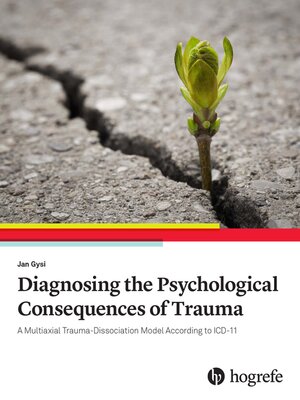Diagnosing the Psychological Consequences of Trauma
ebook ∣ A Multiaxial Trauma-Dissociation Model According to ICD-11
By Jan Gysi

Sign up to save your library
With an OverDrive account, you can save your favorite libraries for at-a-glance information about availability. Find out more about OverDrive accounts.
Find this title in Libby, the library reading app by OverDrive.



Search for a digital library with this title
Title found at these libraries:
| Library Name | Distance |
|---|---|
| Loading... |
Tremendous progress has been made in the diagnosis and treatment of the consequences of trauma over the past two decades, which have led to significant changes being introduced in the ICD-11 and the DSM-5. Navigating this wealth of new knowledge in psychotraumatology, as well as keeping track of the various posttraumatic symptoms and disorders that can present in clients, can be challenging. The brilliantly structured, full-color navigation charts in this volume help both early career and experienced professionals to keep track of the variety of diagnostic options to be considered or excluded while not overlooking anything. After an introduction to the trauma-dissociation axis model, the five axes are then presented in detail, including case examples, differential diagnoses, recommendations, decision paths, and questionnaires: - Axis I: Personality disorders (including, borderline) - Axis II: Disorders specifically associated with stress (including, PTSD, CPTSD, and prolonged grief disorder) - Axis III: Structural dissociation of the personality (dissociative and partial dissociative identity disorder) - Axis IV: Other dissociative disorders (dissociative neurological symptom disorder, depersonalization-derealization disorder, dissociative amnesia) - Axis V: Comorbid disorders The last two chapters provide an overview of the special diagnostic aspects of reporting to law enforcement agencies and a catalog of questions collated by the author to help guide diagnosis and inform treatment. This volume is an exceptional resource for psychiatrists, clinical psychologists, psychotherapists, and other mental health professionals who work with traumatized individuals.







